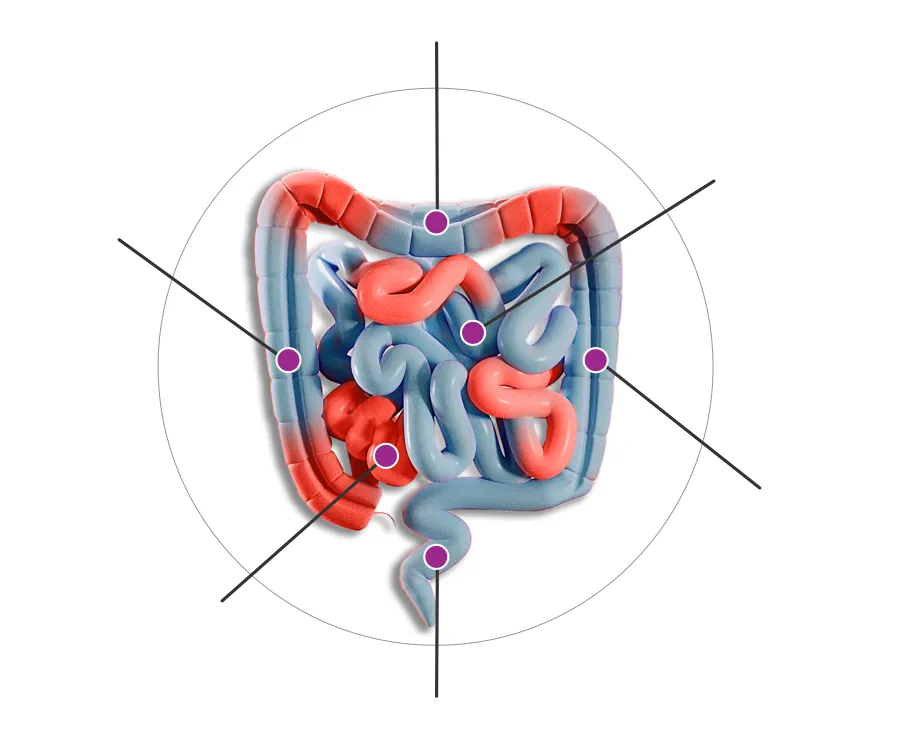- Do not receive ENTYVIO® if you have had an allergic reaction to ENTYVIO or any of its ingredients.
-
ENTYVIO may cause serious side effects, including:
- Infusion-related and serious allergic reactions can happen while you are receiving ENTYVIO or several hours after treatment. You may need treatment if you have an allergic reaction. Tell your healthcare provider or get immediate medical help if you get any of these symptoms during or after an infusion of ENTYVIO: rash, itching, swelling of your lips, tongue, throat or face, shortness of breath or trouble breathing, wheezing, dizziness, feeling hot, or palpitations (feel like your heart is racing).
- Infections. ENTYVIO may increase your risk of getting a serious infection. Before receiving and during treatment with ENTYVIO, tell your healthcare provider if you think you have an infection or symptoms of an infection, such as fever, chills, muscle aches, cough, shortness of breath, runny nose, sore throat, red or painful skin or sores on your body, tiredness, or pain during urination.
- Progressive Multifocal Leukoencephalopathy (PML). People with weakened immune systems can get progressive multifocal leukoencephalopathy (PML) (a rare, serious brain infection caused by a virus). Although unlikely while receiving ENTYVIO, a risk of PML cannot be ruled out. PML can result in death or severe disability. There is no known treatment, prevention, or cure for PML. Tell your healthcare provider right away if you have any of the following symptoms: confusion or problems thinking, loss of balance, change in the way you walk or talk, decreased strength or weakness on one side of the body, blurred vision, or loss of vision.
- Liver problems can happen in people who receive ENTYVIO. Tell your healthcare provider right away if you have any of the following symptoms: tiredness, loss of appetite, pain on the right side of your abdomen, dark urine, or yellowing of the skin and eyes (jaundice).
- The most common side effects of ENTYVIO include: common cold, headache, joint pain, nausea, fever, infections of the nose and throat, tiredness, cough, bronchitis, flu, back pain, rash, itching, sinus infection, throat pain, pain in extremities, and with injections under the skin: pain, swelling, itching, hives, bruising, rash, or redness at the injection site. These are not all the possible side effects of ENTYVIO. Call your healthcare provider for medical advice about side effects.
- Before receiving ENTYVIO, tell your healthcare provider about all of your medical conditions, including if you: have or think you may have an infection or have infections that keep coming back; have liver problems; have tuberculosis (TB) or have been in close contact with someone with TB; have recently received or are scheduled to receive a vaccine; or if you are pregnant, breastfeeding, plan to become pregnant, or plan to breastfeed.
- Tell your healthcare provider about all the medicines you take, especially if you take or have recently taken Tysabri (natalizumab), Tyruko (natalizumab-sztn), a Tumor Necrosis Factor (TNF) blocker medicine, a medicine that weakens your immune system (immunosuppressant), or corticosteroid medicine.
Please see accompanying full Prescribing Information, including the Medication Guide, for ENTYVIO and talk with your healthcare provider.
ENTYVIO is available for:
- intravenous (IV) infusion: 300 mg vedolizumab.
- subcutaneous (SC) injection: 108 mg vedolizumab.
You are encouraged to report negative side effects of prescription drugs to the FDA.
Visit www.fda.gov/medwatch or call 1-800-FDA-10881-800-FDA-1088.
What is ENTYVIO (vedolizumab)?
ENTYVIO is a prescription medicine used in adults for the treatment of:
- moderately to severely active ulcerative colitis (UC).
- moderately to severely active Crohn’s disease (CD).
It is not known if ENTYVIO is safe and effective in children under 18 years of age.





